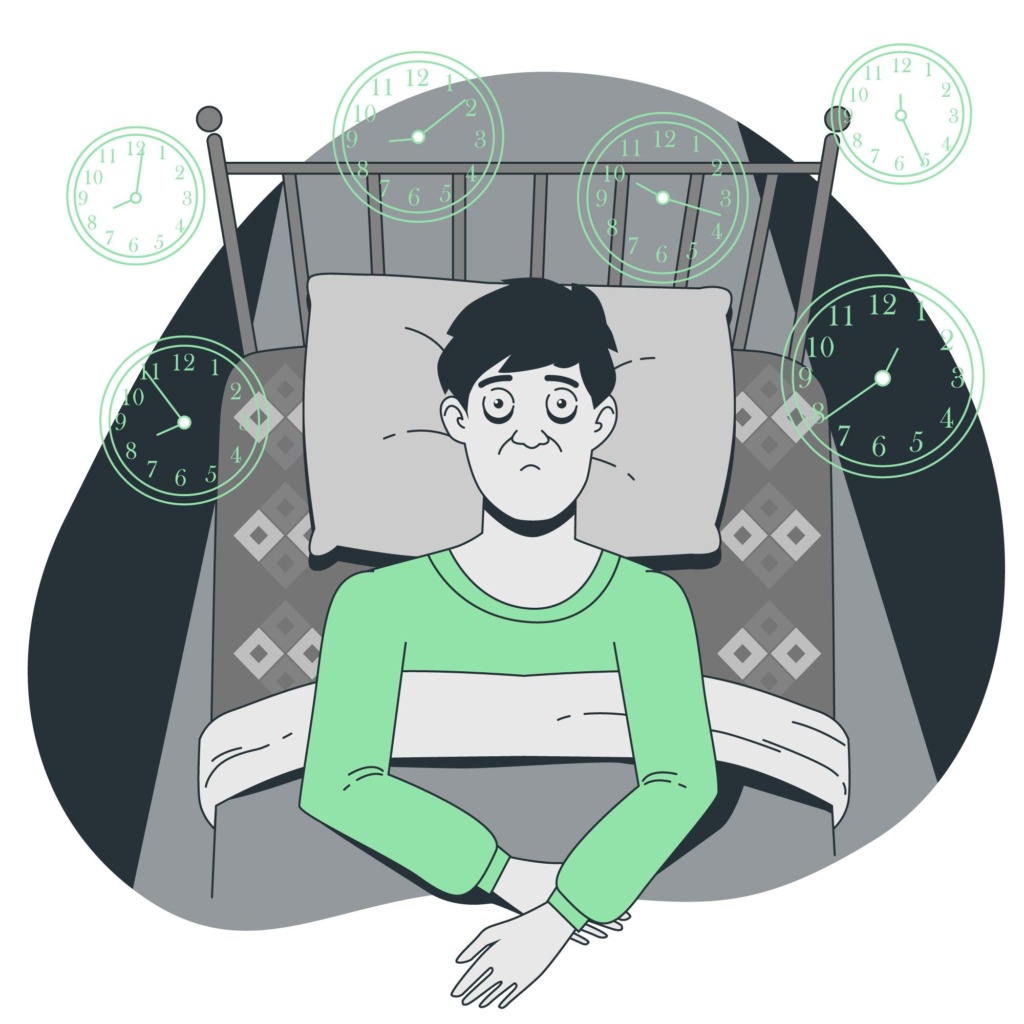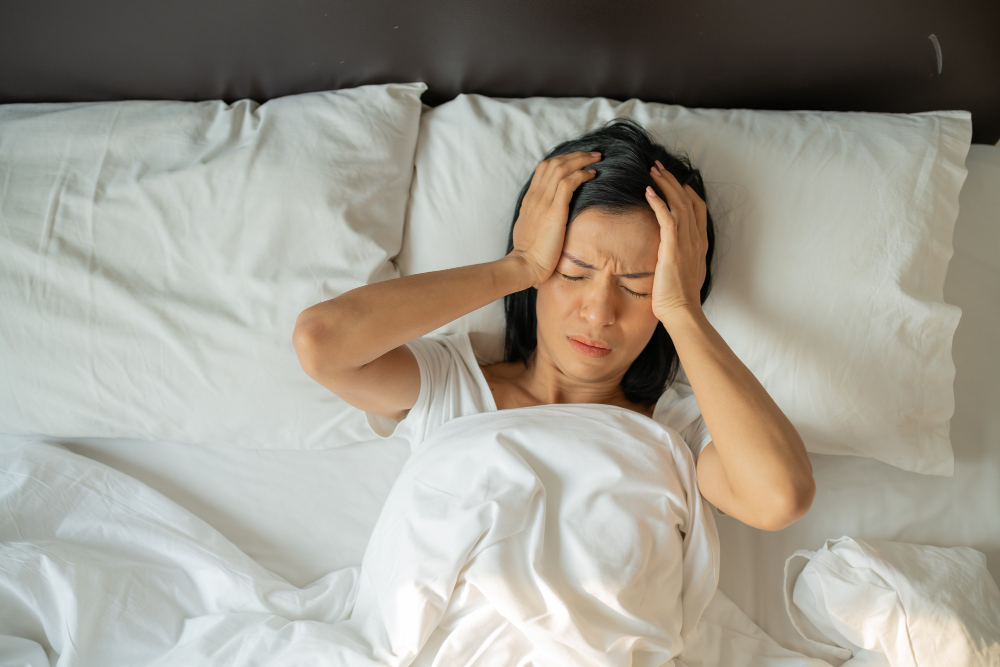More than just a period of physical rest, sleep is a basic human need, just as vital to our health as food and drink. However, millions of people suffer from a variety of sleep disorders that make it difficult for them to get a decent night’s sleep. These disturbances may have a major effect on our emotional state, level of energy, and general quality of life, as well as our physical and mental health.
We’ll go into the topic of common sleep disorders in this post, looking at their causes, signs, and available treatments. By being aware of these disorders, we can better equip ourselves to get the care we need from professionals and resume regular sleep schedules.

The Importance Of Quality Sleep
Let’s go over the value of good sleep once again before discussing particular disorders. Our bodies go through essential restorative processes when we sleep. Our brains organize memories, eliminate waste, and control hormones essential to many bodily functions. On the other side, lack of sleep can have a number of negative effects. It can weaken our immune system, cause dementia, and raise our chance of developing chronic illnesses like diabetes and heart disease.
The following are indications that you may not be receiving enough restful sleep:
- Inability to focus and retain information
- Excessive drowsiness during the day
- Mood fluctuations and irritability
- Unable to maintain a healthy weight
- Lowered immunity and recurrent infections
It’s critical to see a doctor if you routinely have these symptoms in order to rule out any underlying sleep issues.
Causes Of Sleep Disorder
People with insomnia often have trouble falling asleep, staying asleep, or waking up too early and not being able to go back to sleep. Insomnia can be caused by a number of things, such as stress, anxiety, depression, bad sleeping habits, some drugs, and physical ailments including chronic pain or arthritis.
Symptoms Of Sleep Disorder
Common symptoms of insomnia include difficulty falling asleep, waking up frequently during the night, waking up too early, and feeling tired upon waking. Chronic insomnia can lead to daytime fatigue, irritability, and difficulty concentrating.
Common Sleep Disorders
Sleep disturbances can be caused by so many distinct sleep disorders. Here are some of the most common ones:
1. Sleep Apnea:
There are two main types of sleep apnea: central sleep apnea, which occurs when the brain fails to send proper signals to the muscles that control breathing, and obstructive sleep apnea (OSA), which is caused by the throat muscles relaxing excessively and blocking the airway. Sleep apnea is a serious sleep disorder where breathing repeatedly stops and starts during sleep.
Symptoms Of Sleep Apnea
- Loud snoring
- Witnessed episodes of breathing pauses during sleep
- Waking up with a dry mouth
- Gasping for air during sleep
- Morning headaches
- Difficulty staying asleep
- Daytime sleepiness and fatigue
- Difficulty concentrating
- Irritability
Treatment for Sleep Apnea
Treatment options for sleep apnea include lifestyle changes like losing weight or quitting smoking, using a continuous positive airway pressure (CPAP) machine, and, in severe cases, surgery to remove tissue or reposition the jaw.
2. Restless Legs Syndrome (RLS)
Restless Legs Syndrome (RLS) is a neurological condition characterized by an uncontrollable need to move the legs, typically in response to unpleasant sensations. The sensation might be described as tingling, itching, or achiness, and moving frequently provides brief relief. The specific cause of RLS is unknown, however it is thought to be due to a dopamine imbalance in the brain, which transmits impulses to control the movement of muscles.
Symptoms Of Restless Legs Syndrome (RLS)
- A need to move your legs, frequently worse at night or during resting.
- Difficulty falling or staying asleep due to the impulse to move the legs.
- Movement provides relief from symptoms.
- Feelings like creeping, crawling, tingling, or scorching.
Treatment For Restless Legs Syndrome (RLS)
RLS treatment may include lifestyle modifications such as avoiding coffee and alcohol, developing a regular sleep schedule, and relaxing the muscles with leg massages or warm baths. Medication to treat dopamine levels or nerve pain may also be provided.

3. Insomnia
It is the most common sleep disorder. Insomnia is a common sleep disorder that causes patients to have difficulty falling asleep, staying asleep, or waking up too early and not being able to go back to sleep. It can be acute and last for a few nights or chronic and last for months. Several factors can cause insomnia, including stress, anxiety, depression, poor sleep habits, certain medications, environmental factors such as noise and light, and medical conditions such as arthritis or chronic pain.
Symptoms Of insomnia
- Taking more than 30 minutes to fall asleep
- Waking up several times during the night and having difficulty getting back to sleep
- Waking up early in the morning and feeling tired
- Feeling sleepy and irritable during the day
- Difficulty concentrating
Treatment Of Insomnia
Treating insomnia often involves lifestyle changes, such as: Improving sleep hygiene, establishing a regular sleep schedule, and creating relaxing pre-bedtime habits. Cognitive behavioral therapy (CBT) for insomnia can be very effective, and in some cases, medications may be prescribed to help you sleep.
4. Narcolepsy
Narcolepsy is a chronic sleep disorder characterized by overwhelming daytime sleepiness, sudden attacks of sleep, and cataplexy (sudden loss of muscle control triggered by emotions). It occurs when the brain is unable to properly regulate the sleep-wake cycle. The exact cause is not fully understood, but it may involve genetic factors or abnormalities in brain chemicals such as hypocretin, which regulate the sleep-wake cycle.
Symptoms Of Narcolepsy
- Excessive daytime sleepiness despite adequate sleep at night
- Sudden attacks of sleep that may occur at any time
- Cataplexy (sudden muscle weakness caused by emotions)
- Sleep paralysis (a feeling of being unable to move when falling asleep or waking up)
- Hallucinations (dream-like experiences when falling asleep or waking up)
Treating Narcolepsy
Treatment for narcolepsy often involves a combination of medication and lifestyle changes. Stimulants may be prescribed to help you stay awake during the day, while antidepressants may help reduce symptoms such as cataplexy and sleep paralysis. Maintaining a regular sleep schedule and taking short naps during the day may also help.
5. Shift Work Sleep Disorder
This disorder affects people who work irregular hours, such as night shifts. Their sleep-wake cycle gets disrupted, leading to difficulty falling asleep and staying asleep during the day.
Symptoms Of Shift Work Sleep Disorder
- Difficulty falling asleep or staying asleep during the day
- Excessive sleepiness during the evening or night
- Disrupted digestive system
- Mood swings and irritability
- Difficulty concentrating
6. Circadian Rhythm Disorders
Circadian rhythm disorders occur due to a mismatch between an individual’s internal biological clock and the external environment. Common sleep disorders include Delayed Sleep Phase Disorder (DSPD), Advanced Sleep Phase Disorder (ASPD), and Shift Work Sleep Disorder. These problems can be caused by erratic work schedules, jet lag, poor sleep hygiene, and certain medical diseases. Genetics and age might also have an impact.
Symptoms of Circadian Rhythm Disorders
Symptoms include trouble falling asleep or getting up at the right time, excessive daytime sleepiness, and insomnia. These illnesses have a substantial influence on everyday functioning and overall health.
Treatment for Circadian Rhythm Disorders
Light treatment may be used to reset the biological clock, as well as chronotherapy (gradually altering sleep times) and improved sleep hygiene. In rare circumstances, melatonin supplements may be suggested.

7. Parasomnias
Parasomnias are a type of sleep disorder characterized by unusual behaviors, movements, feelings, perceptions, and dreams that occur before falling asleep, while sleeping, or upon awakening. Sleepwalking, night terrors, and REM sleep behavior disorder are three common forms. The specific origins of parasomnias are unknown, however they could be linked to genetics, stress, sleep deprivation, or certain drugs. Other sleep problems, such as sleep apnea, can cause insomnia as well.
Symptoms of Parasomnias
Symptoms vary depending on the type of parasomnia, but may include episodes of walking or other activity while sleeping, severe fear or shouting, and acting out nightmares.
Treatment for Parasomnias
Treatment frequently includes addressing the underlying sleep issue, increasing sleep hygiene, and creating a safe sleep environment. In severe cases, medications may be administered to alleviate symptoms.
Conclusion
Sleep disorders can have a substantial influence on your quality of life; however, recognizing their causes, symptoms, and treatment options can help you take steps toward improved sleep. If you feel you have a sleep disturbance, you should seek medical assistance to decide the best course of treatment.
FAQs
What are the most common sleep disorders?
The most common sleep disorders include insomnia, sleep apnea, restless legs syndrome (RLS), narcolepsy, circadian rhythm disorders, and parasomnias.
How can I improve my sleep naturally?
To improve your sleep naturally, establish a regular sleep schedule, create a relaxing bedtime routine, limit caffeine and alcohol intake, and ensure your sleep environment is comfortable and free from distractions.
When should I see a doctor about my sleep problems?
You should see a doctor about your sleep problems if you experience persistent difficulty sleeping, excessive daytime sleepiness, loud snoring, or other symptoms that interfere with your daily life.
Are sleep disorders genetic?
Some sleep disorders, such as narcolepsy and certain types of circadian rhythm disorders, can have a genetic component. However, environmental factors and lifestyle choices also play a significant role.
Can lifestyle changes help with sleep disorders?
Yes, lifestyle changes such as improving sleep hygiene, maintaining a regular sleep schedule, reducing stress, and avoiding stimulants can help manage and alleviate symptoms of many sleep disorders.



